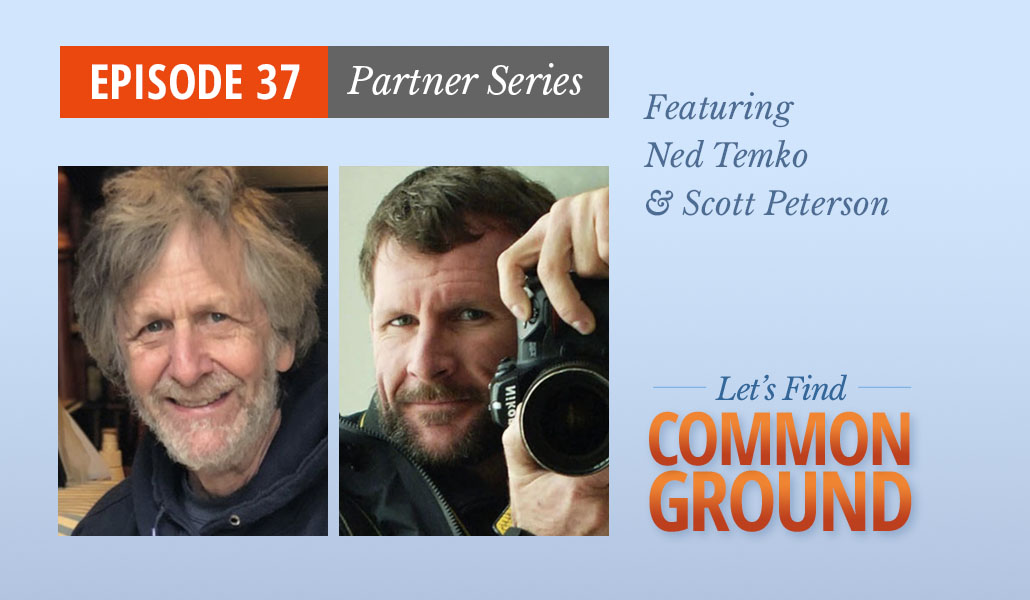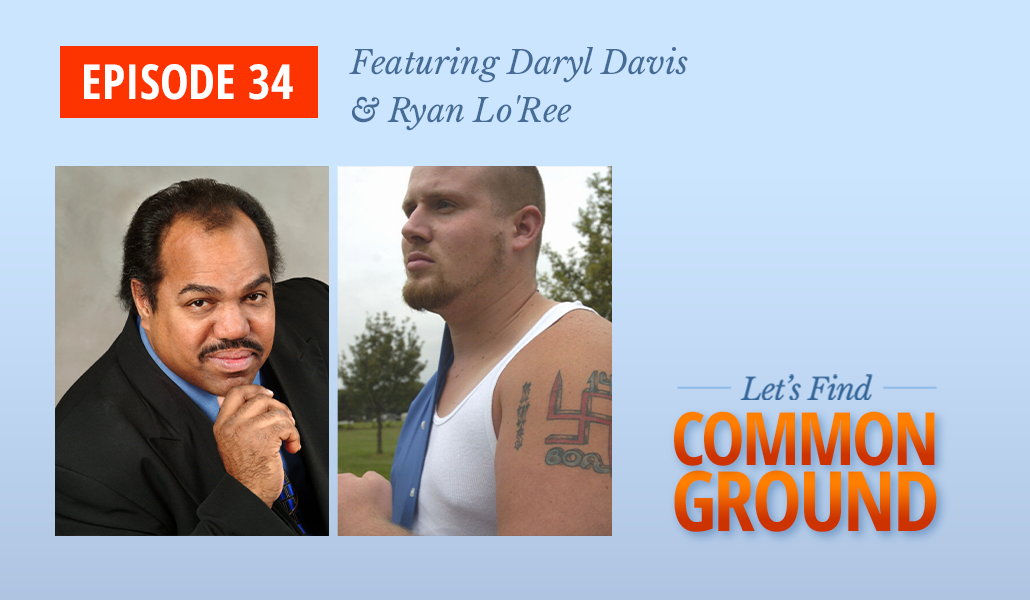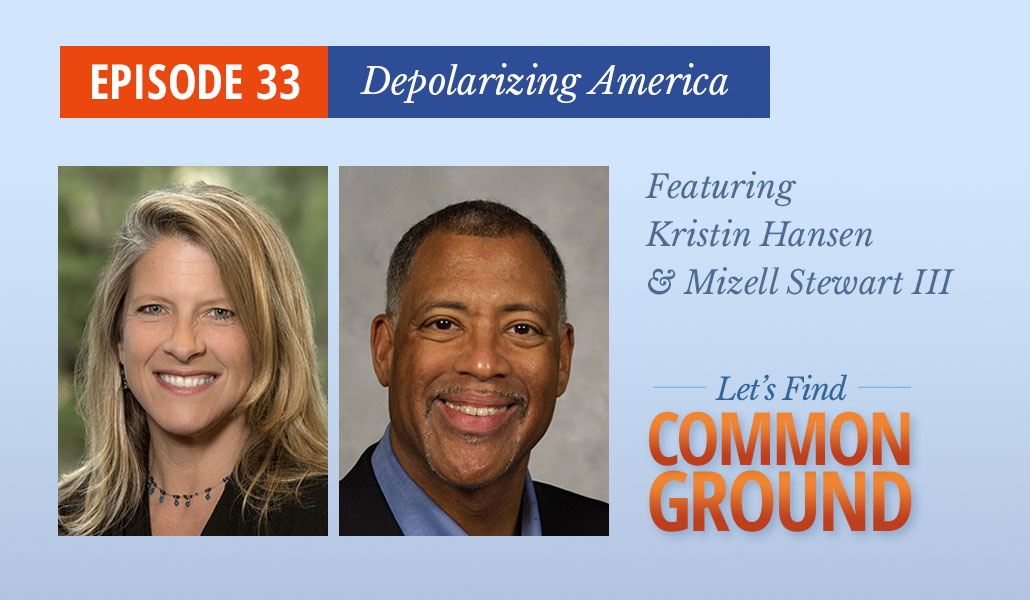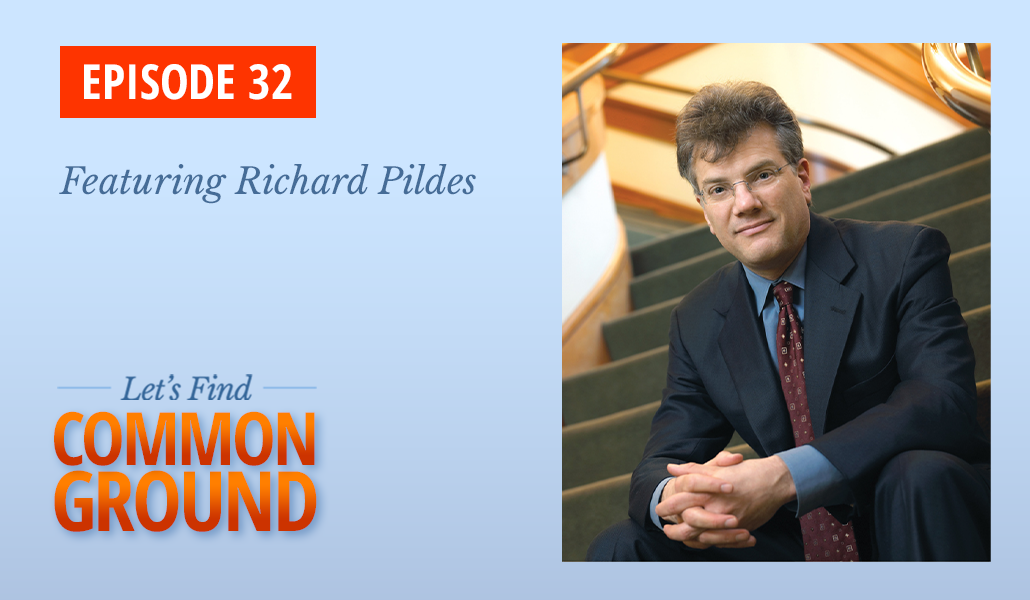Bruce Bond Featured on Fox 5 New York’s “Good Day Street Talk”
Co-founder and CEO of Common Ground Committee, Bruce Bond speaks with Antwan Lewis about bridging divides in America.
Co-founder and CEO of Common Ground Committee, Bruce Bond speaks with Antwan Lewis about bridging divides in America.
Do we need a younger Congress? Common Ground Committee co-founder Bruce Bond weighs in during this “You Decide 2022” segment on FOX 5 NY.
Conversation addressing solutions for the ongoing problem of gun violence will be the nonprofit’s first in-person event since 2020
Wilton, CT, September 7, 2022 – Common Ground Committee (CGC), a nonpartisan, citizen-led nonprofit dedicated to reducing polarization, announced today their upcoming free event on the politics of guns. Senator Chris Murphy (D-CT) will be joined by Will Hurd, former U.S. Representative (R-TX), CIA officer and author of American Reboot: An Idealist’s Guide to Getting Big Things Done, for a discussion moderated by former CBS News Correspondent and author Jacqueline Adams. The conversation, about how to address the important questions of gun legislation and gun rights, will be held at the Jack Morton Auditorium at George Washington University on September 27, from 6:30 pm to 8 pm ET. Tickets can be reserved here.
Both these individuals are important voices in this debate. Chris Murphy became a leader in the effort to control gun violence when, as a U.S. Representative, his district faced the Sandy Hook Elementary School shooting. Ten years later, in the wake of the mass shooting on May 24 in Uvalde, Texas, now Senator Murphy led the effort to write and pass the Bipartisan Safer Communities Act — the first major federal gun legislation enacted since 1994. When Will Hurd was serving in the House, his district included Uvalde. While getting an “A” from the National Rifle Association, he has aggressively spoken out about the need to find solutions to gun violence while preserving the rights of law-abiding gun owners. As the 2022 midterms approach, guns remain an ”extremely important” issue on the ballot.
“Regardless of what one might believe is the right policy, the Bipartisan Safer Communities Act proved that common ground can be found even on a divisive issue such as guns,” said Bruce Bond, Co-Founder and CEO of CGC. “As has been the case with all of our events we believe Americans who attend this one will leave inspired and hopeful that further progress can be made on this serious issue.”
This will mark CGC’s first in-person event since February, 2020, a discussion on the media with Chris Wallace and Maggie Haberman, and is presented in partnership with the BridgeUSA’s GW chapter and the Nashman Center for Civic Engagement and Public Service.
Sen. Murphy and former Congressman Hurd will be available for interviews following the event. For interview requests, please contact Zach Halper at zhalper@momentum-cg.com or 862-224-3233
###
About Common Ground Committee
Common Ground Committee (CGC) is a nonpartisan, nonprofit 501(c)(3) citizen-led organization dedicated to bringing healing to the national challenges of polarization and incivility. Since its founding in 2009, CGC has held 17 public forums featuring panelists who have reached over 250 points of consensus. Panelists have included such notable pairings as John Kerry and Condoleezza Rice, David Petraeus and Susan Rice, Michael Steele and Donna Brazile, Chris Wallace and Maggie Haberman, and Larry Kudlow and Barney Frank, exploring issues ranging from race and income inequality to foreign policy. CGC produces the “Let’s Find Common Ground” podcast series, which has had over 175 thousand downloads and more than 60 thousand subscribers. CGC also created the Common Ground Scorecard, a voting tool that scores politicians and candidates for public office on their likelihood to find common ground with the opposite party. Free of political agenda and financial influence, CGC has a singular focus on bringing light, not heat, to public discourse.
About BridgeUSA
BridgeUSA is a youth-led 501(c)(3) nonprofit organization that creates spaces on high school and college campuses for open discussion between students about political issues. It began in 2016 at the universities of Notre Dame, CU-Boulder, and UC Berkeley in response to growing polarization on campus. BridgeUSA’s work emphasizes the importance of empathy and understanding, ideological diversity and solution-oriented politics. By engaging America’s youth in constructive discussions, BridgeUSA are equipping the next generation of leaders with the skills necessary for navigating conflict, finding solutions across differences and building bridges in their communities. BridgeUSA is currently located on over 50 college campuses and 24 high school campuses in the U.S.
About Nashman Center for Civic Engagement and Public Service
The mission of the Honey W. Nashman Center for Civic Engagement and Public Service is to integrate civic engagement into George Washington University’s educational work. The center promotes equity and active citizenship in a diverse democracy, focuses GW’s resources to address community needs through reciprocal partnerships beyond the campus, and enhances teaching, learning, and scholarship at GW.
Chris Wallace and Jonathan Karl will discuss how the media impacts America’s views in a conversation moderated by CBS correspondent Jacqueline Adams
Wilton, CT, April 8, 2022 – Common Ground Committee (CGC), a nonpartisan, citizen-led nonprofit dedicated to reducing polarization, announced their upcoming, free event on the role of the media in politics. CNN+ anchor Chris Wallace will be joined by Jonathan Karl, the Chief Washington Correspondent for ABC News and the co-anchor of This Week with George Stephanopoulos. Their conversation, about how the media impacts American attitudes, and how public trust can be restored as news outlets navigate a changing landscape, will be moderated by former CBS news correspondent and author Jacqueline Adams.
This will mark Wallace’s second appearance with CGC. He previously took part in a discussion with The New York Times’ Maggie Haberman at Columbia University in 2020.
“At a time when division is at an all-time high and with the midterm elections approaching, we are grateful that Chris and Jonathan can lend their wisdom to this conversation,” said Bruce Bond, co-founder and CEO of CGC. “By the end of the evening, we hope attendees will have the tools they need to advocate for less polarized media.”
This virtual panel discussion is presented in partnership with the Bridge Alliance and will kick off the National Week of Conversation 2022 when Americans from all backgrounds and beliefs will come together at over 100 events to make a difference. To attend this free event, please sign up online here.
“We could not be more excited to partner with the Common Ground Committee to kick off the National Week of Conversation,” said Debilyn Molineaux, president and CEO of the Bridge Alliance. “Now more than ever, it’s important to combat the division plaguing our country. Having open conversations is one of the most effective ways to do so. We look forward to hearing Chris’ and Jonathan’s insights on how the media can regain public trust.”
Chris Wallace and Jonathan Karl will be available for interviews following the event. For interview requests, please contact Emily Cooper at ecooper@momentum-cg.com or 212-671-2086
###
About Common Ground Committee
Common Ground Committee (CGC) is a nonpartisan, nonprofit 501(c)3 citizen-led organization dedicated to fostering more progress and less division in politics. Since its founding in 2009, CGC has held 14 public forums featuring panelists who have reached over 200 points of consensus. Panelists have included such notable pairings as John Kerry and Condoleezza Rice, David Petraeus and Susan Rice, Michael Steele and Donna Brazile, and Larry Kudlow and Barney Frank, exploring issues ranging from race and income inequality to foreign policy. CGC produces the “Let’s Find Common Ground” podcast series, which has had over 100 thousand downloads. CGC also created the Common Ground Scorecard, a voting tool that scores politicians and candidates for public office on their likelihood to find common ground with the opposite party. Free of political agenda and financial influence, CGC has a singular focus on bringing light, not heat, to public discourse.

The takeover of the Taliban in Afghanistan; a more aggressive China and Russia; a newly-elected hardline President in Iran, are all major challenges facing President Joe Biden and his administration.
Our podcast guests are Ned Temko, who writes the weekly international affairs column “Patterns” for The Christian Science Monitor, and Scott Peterson, the Monitor’s Middle East bureau chief. Both are highly experienced and well-traveled foreign correspondents, who bring depth and expertise to coverage of global affairs.
Among the many topics covered in this episode: Similarities and differences to President Trump’s “America First” approach, the implications of the rapid withdrawal of US forces from Afghanistan, why China is the biggest overseas challenge for the Biden Administration, relations with America’s allies, and the increased threat to human rights in Asia and the Middle East.
Ep. 37: American Foreign Policy – Challenges, Threats, Opportunities.
Ned Temko writes the weekly international affairs column “Patterns” for The Christian Science Monitor. A longtime Monitor foreign correspondent, he was based in Beirut, Jerusalem, Moscow, and Johannesburg before moving to London at the end of the 1980s for the Monitor’s television news program.
He has covered stories ranging from Middle East war and peace and the hostage crisis in Iran to the final years of Soviet Communism and apartheid in South Africa. As the Monitor TV correspondent, he also covered the fall of the Berlin Wall and Nelson Mandela’s release from prison.
Scott Peterson covers the Middle East for The Christian Science Monitor from London, with a special focus on Iran, Iraq, and Syria. A well-traveled and experienced foreign correspondent who is also a photographer for Getty Images in New York, he has reported and photographed conflict and powerful human narratives across three continents for more than two decades.
Scott first joined the Monitor in 1996 as the Middle East correspondent based in Amman, Jordan, then became the Moscow bureau chief. In Afghanistan, he traveled with the Taliban in 1999, and later was witness to their collapse when Kabul fell in 2001.
He has made 30 visits to Iran, which form the backbone of his book Let the Swords Encircle Me: Iran – A Journey Behind the Headlines (Simon & Schuster, 2010). He has also frequently reported from Iraq, first during the 1991 Kurdish uprising, when he secretly crossed the border from Turkey, before being forced to flee across the mountains with more than a million Kurds – and a handful of fellow journalists – when Saddam Hussein’s armed forces crushed the resistance.
Since 1997, he has traveled often to Baghdad, except for a two-year period when he was blacklisted by the former regime. He was embedded for one month with US Marines during their November 2004 assault on Fallujah. Prior to joining the Monitor, Scott covered the 1991 Persian Gulf War, Africa, and the Balkans for The Telegraph (London) and was based in Cyprus; Nairobi, Kenya; and Zagreb, Croatia.
Scott is the author of Me Against My Brother: At War in Somalia, Sudan, and Rwanda (Routledge, 2000), about his work in war zones in Africa during six years in the 1990s.
Read more about Scott’s work on his website.
Want to hear more? Check out our podcast page to see all the discussions!

What steps are needed to cause people to leave white supremacists and other hate groups of their own volition? In this deeply personal podcast episode, we explore the tactics and commitment needed to be successful in this work.
Daryl Davis, an award-winning Black musician, race reconciliator, and renowned lecturer, has used the power of human connection to convince hundreds of people to leave white supremacist groups. His fellow guest, Ryan Lo’Ree, a former white supremacist, is now an interventionist working to deradicalize people who have been lured into right and left-wing extremism.
These two men, who came from very different backgrounds and belief systems, discuss their life experiences, lessons learned in their work, and what motivates them to convince people to change their convictions.
Watch the recording of the Common Ground webinar with Daryl and Ryan: “Turning Racism and Extremism into Hope and Healing.”
Listen to our 2020 podcast with Daryl: “KKKrossing the Divide – A Black Man Talks With White Supremacists.”
Read Nicholas Kristof’s profile of Daryl in The New York Times— “How Can You Hate Me If You Don’t Even Know Me?”
Ep. 34: How to Take Direct Action Against Hate
Award-winning musician Daryl Davis earned a degree in Jazz and tours nationally and internationally with The Daryl Davis Band. He is also the first Black author to interview KKK leaders and members, detailed in his book, Klan-Destine Relationships. Today, Davis owns numerous Klan robes and hoods, given to him by active members who renounced their racist ideology after meeting him. As a race reconciliator and lecturer, he has received numerous awards and is often sought out by news outlets as a consultant on race relations and white supremacy.
Ryan Lo’Ree, Light Upon Light Interventionist and Program Specialist, was once a right-wing extremist with the Rollingwood Skins, a Michigan-based offshoot of the largest Nazi movement in the United States. To finance these efforts, Ryan found himself in trouble with the law. After Ryan’s incarceration, he went through a process of transformation and healing centered around trauma associated with sexual, physical, and mental abuse he endured from male family members. Ryan has helped to pull dozens of former extremists out of hate groups in Michigan.
Want to hear more? Check out our podcast page to see all the discussions!
a:8:{s:8:”location”;a:1:{i:0;a:1:{i:0;a:3:{s:5:”param”;s:9:”post_type”;s:8:”operator”;s:2:”==”;s:5:”value”;s:12:”conversation”;}}}s:8:”position”;s:15:”acf_after_title”;s:5:”style”;s:7:”default”;s:15:”label_placement”;s:3:”top”;s:21:”instruction_placement”;s:5:”label”;s:14:”hide_on_screen”;a:1:{i:0;s:11:”the_content”;}s:11:”description”;s:0:””;s:8:”modified”;i:1625696744;}
In this piece written for The Hill, Common Ground Committee co-founders Bruce Bond and Erik Olsen analyze recently proposed bills and their impact on voting security and accessibility to determine if political parties can find common ground on voting rights.
Voting is at the core of American democracy. It’s a fundamental right of all eligible voters that should be free from political gamesmanship. Unfortunately, the politics of voting is creating the false narrative that we have to choose between security and accessibility — when the fact is both are not only desired by the clear majority of Americans, but some states are demonstrating that both can be achieved.
Democrats and Republicans are in yet another game of political football over voting. This week’s vote on the For the People Act was partially in response to Republican-led states’ attempts to overhaul their election rules following the 2020 election. In Texas, for instance, a proposed bill would cut down on early voting hours and empower GOP poll watchers, giving them greater independence and more access to voters. It would also require IDs for mail-in ballots. Republicans say the move is needed to restore confidence in the system. The chairman of the Democratic National Committee, Jaime Harrison, called the bill “Jim Crow 2.0.”

Nearly seven months after the election, there has yet to be any verifiable evidence that fraud was committed. On the other side of the coin, this is not the first time we’ve heard accusations of voter suppression against election reforms when data to support those charges is hard to come by. Those claims were made repeatedly in Georgia — where another controversial law was recently passed — in 2018 and 2020. Instead of constricting accessibility, voting turnout broke records in both years.
If there is one thing this new law, and others like it, are guilty of, it’s turning the need and popular desire for both voting access and security into a political show.
As the heads of a nonprofit, Common Ground Committee, dedicated to reducing toxic polarization in this country, it’s become clear to us that voting laws have become deeply politicized — to the detriment of our system and ultimately our country.
The most talked-about aspects of these laws seem designed to score political points. Is, for example, giving more authority to poll watchers with partisan leanings really going to increase security? Or, will preventing people from handing out water bottles really cause people to leave the polls before voting? There should only be one objective when it comes to voting: provide access to all eligible voters in a safe and secure manner. The current battle over voter fraud versus voter suppression misses that point entirely.
A recent poll from YouGov/The Economist found that most Americans opposed many of the more controversial parts of the Georgia law, which in many ways mimics the proposed bill in Texas. Yet that same survey revealed one aspect they could get behind: voter IDs. Approximately 53 percent of respondents supported that measure. And just this week, a second poll from Monmouth University found that 80 percent of Americans supported voter IDs. While some activists argue such requirements are racist, other polling shows broad support for IDs among Black and other non-white voters.
It is evident: Americans believe voters should be able to prove they are who they say they are. They also want anyone who is eligible to vote to have that opportunity. So why are Democrats attempting to hamper states’ ability to check voter IDs, and why are Republicans fighting for laws that are confusing and would have little impact? If the left and right would stop fighting for a moment, they would see there are states that have expanded access while ensuring security at the same time.
In the lead-up to the 2020 election, there was a lot of talk about the five states that already allowed all voters to vote by mail — Colorado, Hawaii, Oregon, Utah, and Washington. These states have the technology and infrastructure to keep ballots secure and the proof is in the satisfaction of the electorate. Voters on both sides of the aisle in all five states are overwhelmingly supportive of vote-by-mail. Utah, which has a predominantly conservative electorate, has the second-highest rate of support among that group.
Instead of passing confusing and ineffective laws for political posturing, states must invest in the type of security infrastructure that keeps mail-in ballots secure. In Washington, a deep-blue state with a Republican Secretary of State, signatures on ballots are matched to an online database to confirm identity, and “air-gap” computers are used to prevent hacking. To be sure, these systems did not develop overnight — it took Washington many years to perfect this method. All the more reason states should stop wasting time and get to work now.
– This article was originally published in The Hill on June 24, 2021.

We examine two brave and successful attempts to get Americans of differing backgrounds and political convictions to engage in personal face-to-face conversations.
America Talks and the National Week of Conversation, both held in mid-June, were part of ongoing efforts to push back against deep divides and toxic polarization.
In this episode, we discuss lessons learned, insights gained, and the vital difference between talking and listening. Our guests are Kristin Hansen, Executive Director at Civic Health Project and Director at AllSides; and Mizell Stewart, Vice President, News Performance, Talent & Partnerships for Gannett and the USA Today Network. Both were involved in this new initiative.
Ep. 33: Depolarizing America – #ListenFirst and America Talks
Kristin Hansen is Executive Director at Civic Health Project, Director at the media technology company AllSides, and Lecturer in Management at Stanford University Graduate School of Business. She contributes her executive skills and experience to the movement across the United States to reduce polarization, improve civil discourse, and restore democracy. Kristin serves as an advisor for AllSides’ online civil discourse and dialogue initiatives including America Talks and AllSides Connect.
Mizell Stewart III is Vice President, News Performance, Talent & Partnerships for Gannett and the USA TODAY Network. He is the former Chief Content Officer of Journal Media Group and former VP/Content of the Newspaper Division of The E.W. Scripps Company. Earlier in his career, he led newsrooms in Akron, Ohio; Evansville, Indiana; and Tallahassee, Florida.

American democracy is being challenged by hyper-polarization, widespread distrust of competing parties, and vocal extremists whose intrenched views further divide the nation. In a recent poll: Few in US say democracy is working very well, only one-in-six Americans said our democratic system is working very well, while nearly two-in-three voters told a Pew Research Center survey that major reforms are needed.
“I certainly feel we are more vulnerable than we have ever been in the modern era,” says our podcast guest, constitutional law scholar Rick Pildes, a professor at New York University’s School of Law and author of the book The Law of Democracy: Legal Structure of the Political Process.
In this episode, we discuss proposed changes aimed at strengthening democracy, particularly elections — from ranked choice voting and reform of political primaries, to limiting gerrymandering, and campaign finance reform.
Ep. 32: Guardrails of Democracy – Law & Reform
Richard Pildes is one of the nation’s leading scholars of constitutional law and a specialist in legal issues concerning democracy. A former law clerk to Justice Thurgood Marshall, he has been elected into the American Academy of Arts and Sciences and the American Law Institute, and has also received recognition as a Guggenheim Fellow and a Carnegie Scholar. In dozens of articles and his acclaimed casebook, The Law of Democracy, he has helped create an entirely new field of study in the law schools. His work in this field systematically explores legal and policy issues concerning the structure of democratic elections and institutions, such as the role of money in politics, the design of election districts, the regulation of political parties, the structure of voting systems, the representation of minority interests in democratic institutions, and similar issues.
He has written on the rise of political polarization in the United States, the transformation of the presidential nominations process, the Voting Rights Act (including editing a book titled The Future of the Voting Rights Act), the dysfunction of America’s political processes, the role of the Supreme Court in overseeing American democracy, and the powers of the American President and Congress. In addition to his scholarship in these areas, he has written on national-security law, the design of the regulatory state, and American constitutional history and theory. As a lawyer, Pildes has successfully argued voting-rights and election-law cases before the United States Supreme Court and the courts of appeals, and as a well-known public commentator, he writes frequently for The New York Times, The Washington Post, and was part of the Emmy-nominated NBC breaking-news team for coverage of the 2000 Bush v. Gore contest.
This site uses cookies. By continuing to browse the site, you are agreeing to our use of cookies.
OKLearn more×We may request cookies to be set on your device. We use cookies to let us know when you visit our websites, how you interact with us, to enrich your user experience, and to customize your relationship with our website.
Click on the different category headings to find out more. You can also change some of your preferences. Note that blocking some types of cookies may impact your experience on our websites and the services we are able to offer.
These cookies are strictly necessary to provide you with services available through our website and to use some of its features.
Because these cookies are strictly necessary to deliver the website, refusing them will have impact how our site functions. You always can block or delete cookies by changing your browser settings and force blocking all cookies on this website. But this will always prompt you to accept/refuse cookies when revisiting our site.
We fully respect if you want to refuse cookies but to avoid asking you again and again kindly allow us to store a cookie for that. You are free to opt out any time or opt in for other cookies to get a better experience. If you refuse cookies we will remove all set cookies in our domain.
We provide you with a list of stored cookies on your computer in our domain so you can check what we stored. Due to security reasons we are not able to show or modify cookies from other domains. You can check these in your browser security settings.
These cookies collect information that is used either in aggregate form to help us understand how our website is being used or how effective our marketing campaigns are, or to help us customize our website and application for you in order to enhance your experience.
If you do not want that we track your visit to our site you can disable tracking in your browser here:
We also use different external services like Google Webfonts, Google Maps, and external Video providers. Since these providers may collect personal data like your IP address we allow you to block them here. Please be aware that this might heavily reduce the functionality and appearance of our site. Changes will take effect once you reload the page.
Google Webfont Settings:
Google Map Settings:
Google reCaptcha Settings:
Vimeo and Youtube video embeds:
The following cookies are also needed - You can choose if you want to allow them:
Thank you for joining the Common Ground community.
Get to know us and get involved.
